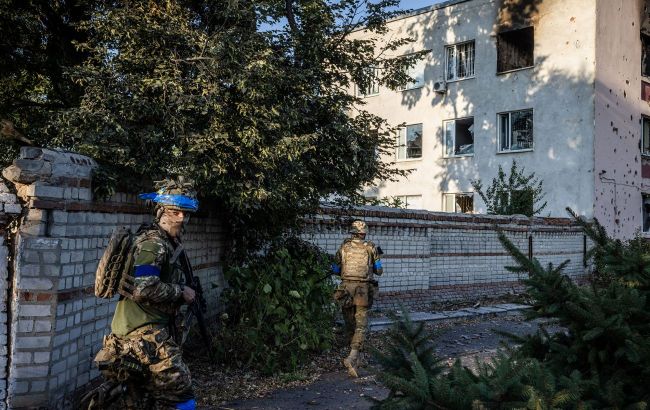Why Kursk operation subsided and whether Russia will dare to counterattack: Expert opinion
 Illustrative photo (Getty Images)
Illustrative photo (Getty Images)
Nearly a month has passed since the beginning of the Ukrainian Armed Forces' offensive in the Kursk region. While in the early days of the operation, Ukraine gained control over a significant portion of Russian territory, the pace has occasionally slowed. Despite this, Ukrainian forces continue to carry out active operations, replenishing their exchange fund.
To understand why the Kursk operation has somewhat slowed down and whether Russia might counterattack in this direction, RBC-Ukraine spoke with a military expert, retired Major of the Ukrainian Armed Forces, Oleksii Hetman.
Why has Kursk operation quieted down?
The success of this operation primarily lies in the fact that Ukrainian forces utilized the element of surprise. As the expert explained to the publication, prior to this, Ukraine conducted a powerful disinformation campaign, making the Russians believe that the troops Ukraine was assembling in the Sumy region were meant for defensive purposes. In reality, offensive actions were being prepared, and the enemy did not expect this.
"This element of surprise can be compared to a window of opportunity. But it can only stay open for 2-3 weeks. After that, the enemy no longer experiences this effect. Therefore, they regroup, pull in reinforcements, and take all necessary actions to prevent our troops from advancing further," Hetman believes.
However, one thing is already certain: Kyiv plans to hold the already captured Russian territories for an indefinite period. As President Volodymyr Zelenskyy explained in an interview with NBC News, this is an integral part of the plan to end the war.
"I think we do not plan to withdraw from these territories at least for now. We will keep our troops and military command there. This includes providing everything necessary for the local Russian civilian population, something the Russians never did on our territories. Nevertheless, we must do this in accordance with international law," Hetman said.
Whether further Ukrainian advancement into Russia will take place depends on the General Staff of the Armed Forces of Ukraine and its plans. As recently reported by the spokesperson for the Operational-Tactical Group Siversk, Vadym Mysnyk, the Ukrainian Armed Forces continue the operation and fulfill the tasks set before them, without revealing specific objectives and results to ensure the plans come to fruition.
"We'll see what the plans are next... There's speculation that we want to advance deep into Kursk, or even to Moscow. Let’s just say, people who express such information have the right to do so, but only a very limited number of people know how things will actually unfold," Hetman explained.
The expert emphasized that this secrecy was key to the operation's success, as it prevented leaks and allowed Ukrainian forces to capitalize on the element of surprise mentioned earlier.
"Now, if a lot of information is disclosed through various sources, it would help the enemy prepare. The Russians themselves say they gather up to 60% of their intelligence from our open sources. It's not because someone is 'leaking' information, but because various individuals say different things, and the Russians then analyze this large amount of data and draw conclusions," Hetman said.
This, according to him, explains the limited amount of information about events in the Kursk region. He assures that the Ukrainian Armed Forces are clearly not just "standing around doing nothing" there.
Does Russia have potential to counterattack?
It is currently evident that Russia stubbornly refuses to abandon its offensive in the Donetsk region, particularly in the Pokrovsk direction, and is reluctant to transfer its most combat-ready units to Kursk. However, CIA Deputy Director David Cohen expressed the opinion that Moscow may initiate a counteroffensive in the Kursk region, though it would be a tough battle for Russians.
"They (Russian forces) may dare to counterattack. But the question is, with what? To conduct counteroffensive actions, they first need to amass a large number of troops and equipment," Hetman said.
So far, Ukraine has forced Russia to transfer 30,000 troops from various units to the Kursk direction, according to Commander Oleksandr Syrskyi.
"This is a mixed bag, and such formations are usually ineffective in combat. For soldiers from different units to become a cohesive force, they need to undergo combat coordination. If this hasn’t been done, then it's not worth considering this a strong formation," Hetman said.
He concluded that the Russian army would attempt offensive actions, but in this direction, two factors currently work against them: poorly coordinated and insufficiently prepared troops, and their small numbers.
"Moreover, Putin has ordered that these territories, where our troops are located, be 'liberated' by October 1st. So they will try something, but with their current forces and resources, they won't be able to achieve this," Hetman added.
As of the latest data, Ukraine has taken control of 1,294 square kilometers and 100 settlements in the Kursk region of Russia. Additionally, around 600 Russian soldiers have been captured. The goal of the Ukrainian Armed Forces' operation is to create a security zone and stop shelling from Russian territory.
Commander of the Ukrainian Armed Forces Oleksandr Syrskyi said that one of the tasks in the Kursk direction was to divert significant enemy forces from other directions, particularly Pokrovsk and Kurakhove. However, the enemy understands this and is instead increasing efforts near Pokrovsk.
Therefore, as recently reported by the American Institute for the Study of War, Moscow is likely redeploying troops to Kursk from less critical directions.
Sources: statements from President Volodymyr Zelenskyy, Commander of the Ukrainian Armed Forces Oleksandr Syrskyi, spokesperson for the Operational-Tactical Group Siversk Vadym Mysnyk, and an exclusive comment from military expert, retired Major of the Ukrainian Armed Forces Oleksii Hetman.

